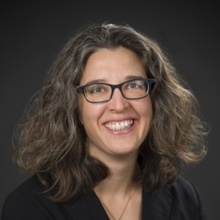By Alice Eberhart
The Department of Chemistry in the College of Liberal Arts and Sciences received a $558,755 grant from the Roy J. Carver Charitable Trust to help grow the radiochemistry program and allow for greater study of radioactive elements on site.
The University of Iowa is one of the few universities to offer training and coursework in radiochemistry. The growth of this program is essential to creating greater access to the field and addressing the current workforce shortage, said Tori Forbes, professor in the Department of Chemistry and director of the University of Iowa Materials Analysis, Testing, and Fabrication Facility.

Forbes, who helps lead the radiochemistry program, is co-PI on the grant from the Roy J. Carver Charitable Trust with chemistry faculty members Scott Daly and Korey Carter.
"The grant from the Roy J. Carver Charitable Trust will be instrumental in helping us grow our program by increasing our capacity to work safely with radioactive elements,” Forbes said. “With our existing and expanding opportunities in radiochemistry, the support from the Roy J. Carver Charitable Trust is crucial.”
Forbes has worked at Iowa since 2010, and there was no radiochemistry program when she joined. Soon after, however, Forbes connected with Professor Michael Schultz from the Carver College of Medicine who works in the area of radiopharmaceutical development.
“Our discussions sparked an idea to create a radiochemistry training program at the University of Iowa, and I feel lucky that I have colleagues in the Department of Chemistry, college, and at the university who supported this idea and helped our program flourish.”
The radiochemistry program has been steadily growing since 2012, with the Department of Chemistry now offering an introductory course to radiochemistry for both undergraduate and graduate students.
“We now have five faculty in the Department of Chemistry who work in the area of radiochemistry and more collaborators across campus,” Forbes said.
One of the major challenges facing the field of radiochemistry is a workforce shortage due to the lack of coursework and training at universities, Forbes noted. This affects national laboratories, radiopharmaceutical and nuclear energy companies, public health laboratories, and national security. The department recently developed a hybrid radiochemistry graduate certificate in collaboration with the State Hygenics Laboratory and the Association of Public Health Laboratories to help address these shortages.
“We are developing new programs to train both current University of Iowa students as well as continued education opportunities for those in the workforce who want to move into the area,” Forbes said.
This new programming and the expanded resources allowed by the Carver grant will benefit new students and seasoned workers alike.
“The Roy J. Carver Charitable Trust, College of Liberal Arts and Sciences, Office of the Vice President of Research, Carver College of Medicine, and the Graduate College have all worked together to support us throughout the years to really develop this initial idea into a nationally recognized program. We are grateful for this support and look forward to growing this program into the future,” Forbes said.